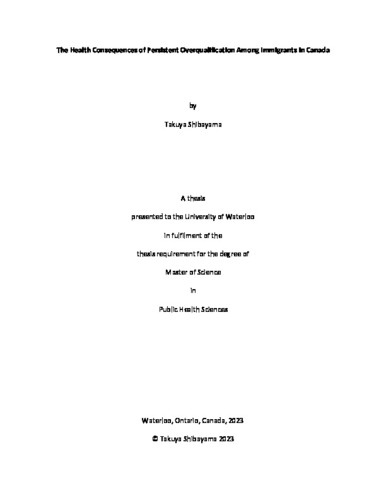| dc.contributor.author | Shibayama, Takuya | |
| dc.date.accessioned | 2023-10-17 17:08:34 (GMT) | |
| dc.date.available | 2023-10-17 17:08:34 (GMT) | |
| dc.date.issued | 2023-10-17 | |
| dc.date.submitted | 2023-09-26 | |
| dc.identifier.uri | http://hdl.handle.net/10012/20042 | |
| dc.description.abstract | Background: Canada’s immigration system prioritizes the admission of highly educated immigrants. Notwithstanding, skilled immigrants often struggle to integrate into the labour force. A considerable body of evidence shows that immigrants are more likely to be overqualified for their jobs compared to their non-immigrant counterparts. The over-representation of immigrants among the overqualified is problematic, as overqualification is associated with poor mental health. Moreover, cross-sectional research suggests that the negative mental health impact of overqualification might be more severe for immigrants than non-immigrants. This study seeks to further investigate the relationship between well-being, overqualification, and immigration status using longitudinal methods.
Methods: This study used data from the Longitudinal and International Study of Adults (LISA), which is a nationally representative survey administered by Statistics Canada. Linear mixed models were used to analyze the affect of overqualification on mental health and life satisfaction trajectories. Mental health was measured via the Kessler 10 Psychological Distress Scale and life satisfaction was measured via a face-valid, one-item measure. To assess if overqualification and well-being (i.e., mental health and life satisfaction) is moderated by immigration status, a three-way interaction term was included in the model. Post-estimation analyses were conducted to unpack significant interaction effects.
Results: Both overqualified immigrants and non-immigrants experienced a significant rise in psychological distress over a four-year period. The negative psychological impact of overqualification was comparable between immigrant and non-immigrant groups. In general, psychological distress scores did not rise above clinically meaningful levels. With respect to life satisfaction, overqualified immigrants experienced an increase over time, whereas overqualified non-immigrants did not.
Conclusion: Overqualification is perceived as an unpleasant experience by both immigrants and non-immigrants alike. Further research investigating longer time trends are necessary to form further conclusions about the relationship between overqualification and mental health. The rise in life satisfaction among overqualified immigrants is similar to findings from past research. Although speculation, such an increase in well-being may be attributable to response shift. Response shift refers to a change in how individuals appraise their satisfaction with life. Life satisfaction may increase among overqualified individuals when other life-domains such as family and relationships become more emphasized or valued over career-related achievements. | en |
| dc.language.iso | en | en |
| dc.publisher | University of Waterloo | en |
| dc.subject | immigrants | en |
| dc.subject | overqualification | en |
| dc.subject | well-being | en |
| dc.subject | mental health | en |
| dc.title | The Health Consequences of Persistent Overqualification Among Immigrants in Canada | en |
| dc.type | Master Thesis | en |
| dc.pending | false | |
| uws-etd.degree.department | School of Public Health Sciences | en |
| uws-etd.degree.discipline | Public Health and Health Systems | en |
| uws-etd.degree.grantor | University of Waterloo | en |
| uws-etd.degree | Master of Science | en |
| uws-etd.embargo.terms | 0 | en |
| uws.contributor.advisor | Martin, Cooke | |
| uws.contributor.affiliation1 | Faculty of Health | en |
| uws.published.city | Waterloo | en |
| uws.published.country | Canada | en |
| uws.published.province | Ontario | en |
| uws.typeOfResource | Text | en |
| uws.peerReviewStatus | Unreviewed | en |
| uws.scholarLevel | Graduate | en |

